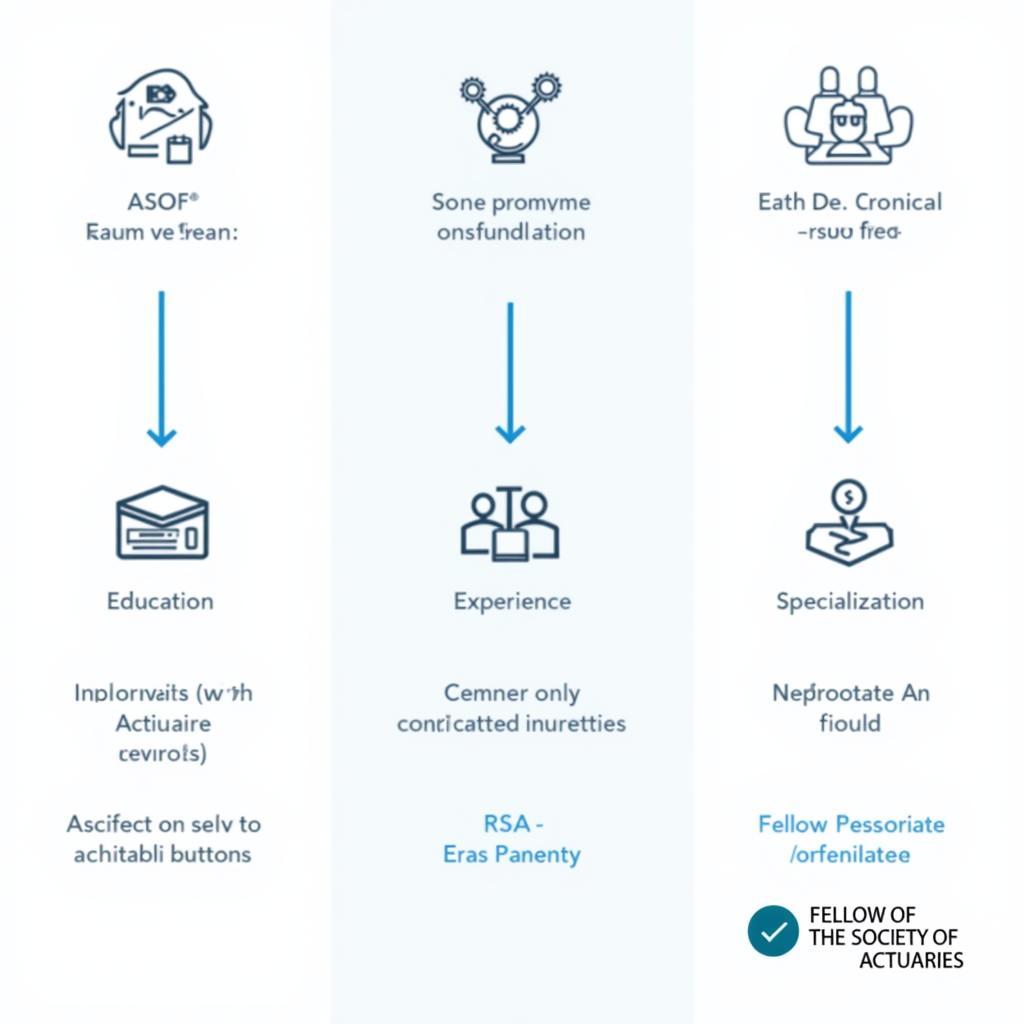The Associate of the Society of Actuaries (ASA) designation is a significant milestone for aspiring actuaries. It represents a strong foundation in actuarial science and a commitment to professional excellence. This article explores the path to becoming an ASA, covering the requirements, exams, and the benefits of achieving this prestigious credential.
What Does it Mean to be an Associate of the Society of Actuaries (ASA)?
The ASA designation signifies that an individual has demonstrated a comprehensive understanding of fundamental actuarial concepts and techniques. Earning the ASA designation requires passing a rigorous series of exams, fulfilling educational requirements, and adhering to the Society of Actuaries’ (SOA) professional standards. This qualification equips aspiring actuaries with the skills and knowledge needed to address complex financial risks and uncertainties.
Requirements for the Associate of the Society of Actuaries (ASA)
The path to becoming an ASA involves several key steps: passing the required preliminary exams, completing the Validation by Educational Experience (VEE) requirements, and fulfilling the Associateship Professionalism Course (APC). The preliminary exams assess knowledge in probability, statistics, financial mathematics, and other core actuarial subjects. The VEE requirements ensure a well-rounded education in economics, corporate finance, and applied statistical methods. Finally, the APC focuses on professional ethics and practices.
 Preparing for the ASA Exams
Preparing for the ASA Exams
The ASA Exams: A Deep Dive
The preliminary exams are a crucial component of the ASA designation. These exams test candidates’ understanding of core actuarial principles and their ability to apply these principles to real-world scenarios. Thorough preparation, including studying recommended textbooks and practicing with past exam papers, is essential for success.
Navigating the Preliminary Exams
The preliminary exams are computer-based and offered multiple times throughout the year. Each exam covers specific actuarial topics, and candidates must demonstrate proficiency in each area to progress towards the ASA designation. Understanding the exam format, syllabus, and scoring system is vital for effective preparation.
Benefits of Becoming an Associate of the Society of Actuaries (ASA)
The ASA designation opens doors to a wide range of career opportunities in the actuarial field. It is a highly respected credential recognized by employers globally, demonstrating a candidate’s commitment to professional excellence and technical competence. ASAs are well-equipped to analyze and manage financial risks in various industries, including insurance, finance, and consulting.
Career Advancement with the ASA Designation
The ASA designation can significantly enhance career prospects. It provides a competitive edge in the job market and can lead to faster career progression and higher earning potential. Many employers consider the ASA designation a prerequisite for certain actuarial roles.
Beyond the ASA: The Fellowship of the Society of Actuaries (FSA)
After obtaining the ASA designation, many actuaries choose to pursue the Fellowship of the Society of Actuaries (FSA) designation. The FSA represents the highest level of professional achievement within the SOA and signifies advanced expertise in specialized actuarial areas.
 The Journey from ASA to FSA
The Journey from ASA to FSA
Conclusion
Earning the Associate of the Society of Actuaries (ASA) designation is a significant accomplishment that marks the beginning of a rewarding career in the actuarial profession. By successfully navigating the exams and fulfilling the requirements, aspiring actuaries gain the knowledge, skills, and recognition needed to thrive in this challenging and dynamic field. The ASA designation serves as a strong foundation for continued professional development and opens doors to exciting opportunities in the world of finance and risk management.
FAQ
- What is the difference between ASA and FSA? ASA is the Associate level, while FSA is the Fellowship level, representing a higher level of expertise.
- How long does it take to become an ASA? The time varies, but it typically takes several years to complete all the exams and requirements.
- What are the career prospects for an ASA? ASAs have excellent career prospects in various industries, including insurance, finance, and consulting.
- Are there any prerequisites for the ASA exams? A strong background in mathematics and statistics is recommended.
- What resources are available for ASA exam preparation? The SOA provides study materials, sample questions, and other resources to help candidates prepare for the exams.
- How much does it cost to become an ASA? There are fees associated with the exams and other requirements.
- Is the ASA designation recognized internationally? Yes, the ASA designation is highly regarded by employers around the world.
Common Scenarios and Questions
- Scenario: A recent college graduate is considering a career in actuarial science. Question: What are the first steps to becoming an ASA?
- Scenario: An individual has passed some of the preliminary exams but is struggling with one particular exam. Question: What resources are available to help me overcome this challenge?
- Scenario: An ASA is considering pursuing the FSA designation. Question: What are the additional requirements for becoming an FSA?
Further Reading and Resources
- Visit the Society of Actuaries website for detailed information about the ASA and FSA designations.
- Explore online forums and communities for actuarial students and professionals.
- Connect with experienced actuaries for mentorship and guidance.
For any support, please contact us at Phone Number: 02043854663, Email: [email protected] Or visit our address: Khu 34, Bac Giang, 260000, Vietnam. We have a 24/7 customer service team.